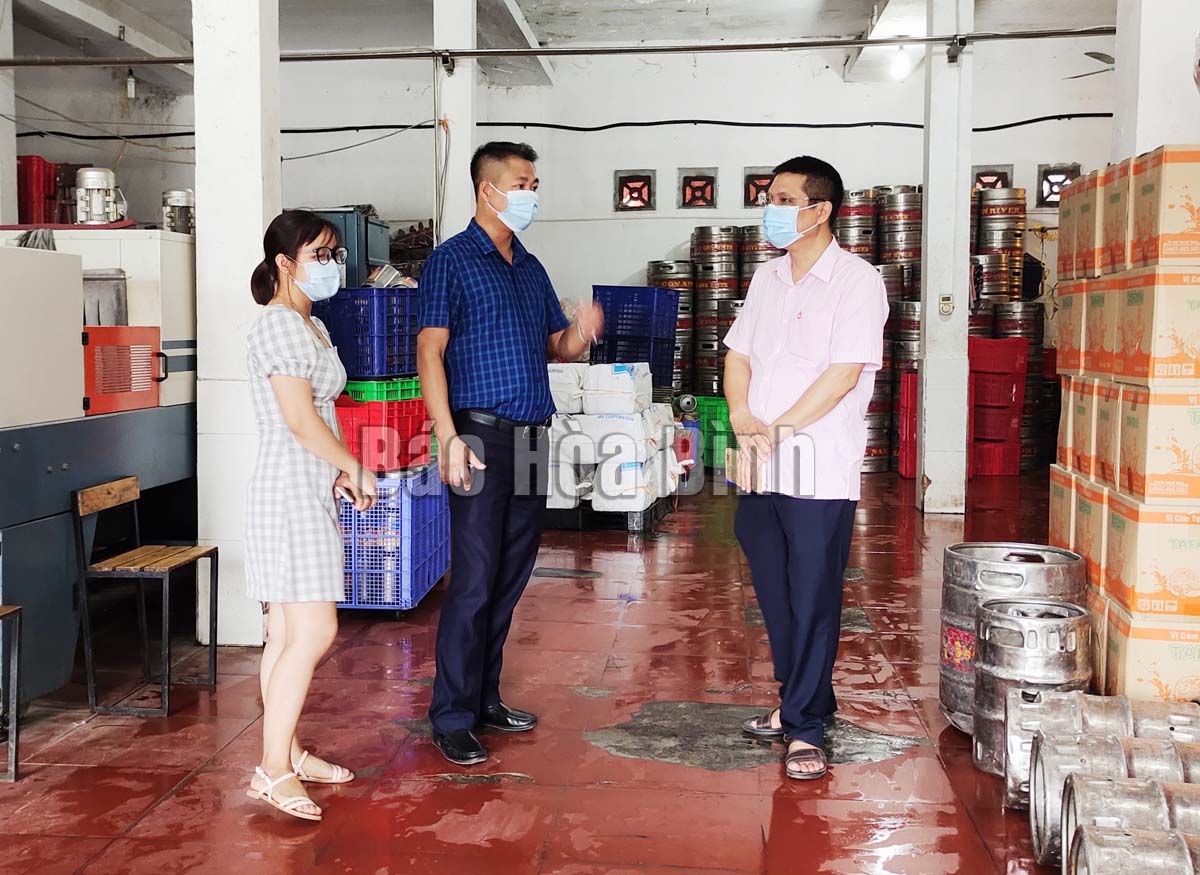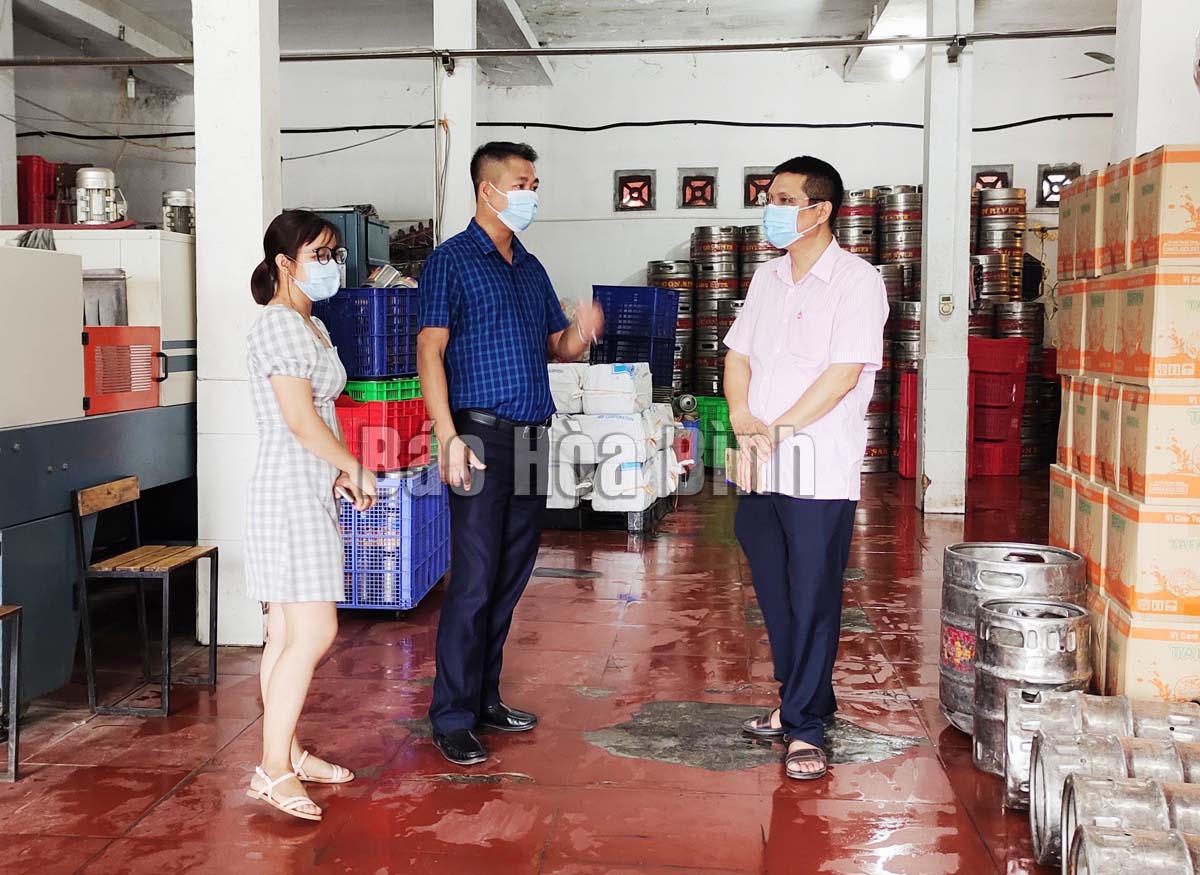
(HBO) - Complicated developments of the COVID-19 pandemic have posed challenges for many enterprises and many workers have lost their jobs. Therefore, the issuance of Resolution No. 68/NQ-CP, dated July 1, 2021, of the Government and Decision No. 23/2021/QD-TTg, dated July 7, 2021 of the Prime Minister are considered as a "life vest" to help businesses and employees overcome a difficult period.

Staff of the Vietnam Bank for Social Policies’ branch in
Hoa Binh province visit businesses to grasp their needs and provide guidance on
how to conduct procedures for accessing loans.
According
to the Vietnam Bank for Social Policies' branch in Hoa Binh province, three
enterprises have loans disbursed to pay the salary for employees who had to
stop working in line with the Government's Resolution 68 and Decision 23 of the
Prime Minister.
Due to the impacts of the pandemic,Corporation IBB joint Stock Company,
which produces and distributes soft drinks and beer, has to suspend production
and business activities.
Nguyen Ngoc Quan, deputy director of the company, said although it temporarily
suspended operations, the company still has to pay salaries and social
insurance contributions for a number of key employees. Thus, it has faced many
difficulties in the past time.
Upon being informed and guided by the Vietnam Bank for Social Policies, the
company has applied for a loan. Thanks to its timely disbursement, the company
was able to overcome difficulties.
"Through the Vietnam Bank for Social Policies’ branch in Hoa Binh
province, we were able to quickly access the loan package under Resolution 68.
This is like a "life vest" for businesses in difficult times,"
Quan said.
Not only businesses have difficulties, but the non-public education system has
also born the brunt of the COVID-19 pandemic over the past two years.
Da
Hop kindergarten and primary school under Da Hop Education System joint Stock
Company is an example.
The
school has had to stop operations twice since the beginning of this year. It
means that there was no revenue so the school has a lot of difficulties in
paying teachers' salaries. The company received support from the branch’s
credit officer with the completion of the procedures and documents to access
capital quickly. Accordingly, more than 470 million VND was disbursed to help
the company pay salaries for over 140 workers.
Dang Duc Hanh, deputy director of the Vietnam Bank for Social Policies' branch
in Hoa Binh province, said there are 3,015 enterprises in the province, with
over 72,000 employees. Of which, nine enterprises have stopped operation, 75
enterprises have workers that have to stopped working, and 12 enterprises
engaged in the fields of transport, tourism, accommodation services, sending
Vietnamese workers to work abroad.
Up to now, the branch has received 10 dossiers from businesses wishing to
borrow capital, of which three businesses have loans been disbursed according
to Resolution 68 and Decision 23.
According to data from the Hoa Binh Provincial Party Committee, the industrial production index for the first six months of 2025 is estimated to have increased by 20% compared to the same period last year. This marks the highest year-on-year growth rate for this period since 2020.
In the first six months of 2025, Hoa Binh province’s export turnover was estimated at 1.145 billion USD, marking an 18.11% increase compared to the same period in 2024. Import turnover was estimated at $ 804 million, a 17.15% increase, which helped the province maintain a positive trade balance.
The lives of the ethnic minority farmers in Tan Lac district have gradually improved thanks to the new directions in agricultural production. This is a testament to the collective strength fostered through the professional associations and groups implemented by various levels of the district’s Farmers’ Union.
With the motto the "product quality comes first,” after nearly one year of establishment and operation, Muong village’s Clean Food Agricultural and Commercial Cooperative, located in Cau Hamlet, Hung Son Commune (Kim Boi district), has launched reputable, high-quality agricultural products to the market that are well-received by consumers. The products such as Muong village’s pork sausage, salt-cured chicken, and salt-cured pork hocks have gradually carved out a place in the market and they are on the path to obtaining the OCOP certification.
In the past, the phrase "bumper harvest, rock-bottom prices" was a familiar refrain for Vietnamese farmers engaged in fragmented, small-scale agriculture. But today, a new spirit is emerging across rural areas of Hoa Binh province - one of collaboration, organisation, and collective economic models that provide a stable foundation for production.
Maintaining growing area codes and packing facility codes in accordance with regulations is a mandatory requirement for agricultural products to be eligible for export. Recently, the Department of Agriculture and Environment of Hoa Binh province has intensified technical supervision of designated farming areas and packing facilities to safeguard the "green passport" that enables its products to access international markets.



